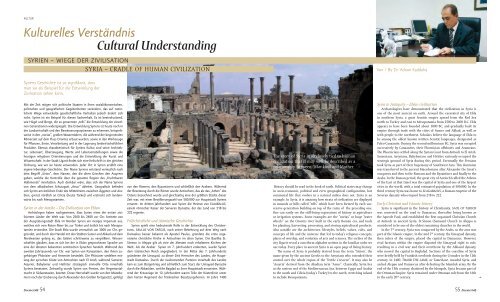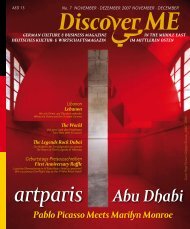Download gesamte Ausgabe - Discover ME
Download gesamte Ausgabe - Discover ME
Download gesamte Ausgabe - Discover ME
Erfolgreiche ePaper selbst erstellen
Machen Sie aus Ihren PDF Publikationen ein blätterbares Flipbook mit unserer einzigartigen Google optimierten e-Paper Software.
Kultur<br />
Kulturelles verständnis<br />
Cultural Understanding<br />
syrien – WieGe Der ziVilisation<br />
syria – CraDle of huMan CiViliZation<br />
syriens Geschichte ist so signifikant, dass<br />
man sie als beispiel für die entwicklung der<br />
zivilisation sehen kann.<br />
Mit der Zeit mögen sich politische Staaten in ihren sozialökonomischen,<br />
politischen und geografischen Gegebenheiten verändern, das auf natürlichem<br />
Wege entwickelte gesellschaftliche Verhalten jedoch ändert sich<br />
nicht. Syrien ist ein Beispiel für diesen Sachverhalt. Es ist beeindruckend,<br />
wie Hügel und Berge, die so genannten „tells“ die Entwicklung der einzelnen<br />
Generationen widerspiegelt. Die Entwicklung Syriens ist heute noch in<br />
der Landwirtschaft und den Bewässerungssystemen zu erkennen, beispielsweise<br />
in den „norias“, großen Wasserrädern, die während der beginnenden<br />
Römerzeit auf dem Fluss Orontes erbaut wurden, sowie in den Werkzeuge<br />
für Pflanzen, Ernte, Verarbeitung und in der Lagerung landwirtschaftlicher<br />
Produkte. Ebenso charakteristisch für Syriens Kultur sind seine Architektur,<br />
Lebensart, Überzeugung, Werte und Lebens einstellungen sowie die<br />
heutigen religiösen Orientierungen und die Entwicklung der Kunst und<br />
Wissen schaft. In der Stadt Ugarit findet sich eine Keilschrift in der gleichen<br />
Ordnung, wie wir sie heute verwenden. Jeder Ort in Syrien erzählt eine<br />
eigene lebendige Geschichte. Der Name Syriens entstand vermutlich nach<br />
dem Begriff „Sirion“, dem Namen, den die alten Griechen den Assyrern<br />
gaben, welche die Kontrolle über die <strong>gesamte</strong> Region des „fruchtbaren<br />
Halbmonds“ innehatten. Auch denkbar wäre, dass sich der Name Syriens<br />
von dem akkadischen Schutzgott „Assur“ ableitet. Geografisch befindet<br />
sich Syrien am östlichen Ende des Mittelmeers zwischen Ägypten und Arabien,<br />
grenzt nördlich an Cilicia (heute Türkei) und erstreckt sich landeinwärts<br />
bis nach Mesopotamien.<br />
syrien in der Antike – die zivilisation von eblan<br />
Archäologen haben nachgewiesen, dass Syrien eines der ersten zivilisierten<br />
Länder der Welt war. Von 2500 bis 2400 vor Chr. breitete von<br />
der Ausgrabungsstadt Ebla im Norden Syrien ein riesiges Imperium aus,<br />
welches sich vom Roten Meer bis zur Türkei und östlich bis nach Mesopotamien<br />
erstreckte. Die Stadt Ebla wurde vermutlich um 3000 vor Chr. gegründet,<br />
und durch den Handel mit den Städten Sumer und Akkad und dem<br />
Nordwesten gelang es, das Gebiet schrittweise zu vergrößern. Wissenschaftler<br />
glauben, dass es sich bei der in Eblan gesprochenen Sprache um<br />
eine der ältesten bekannten semitischen Sprachen handelt. Während des<br />
zweiten Jahr tausends vor Chr. war Syrien von Kanaanäern, den ihnen zugehörigen<br />
Phönizier und Armenier besiedelt. Die Phönizier siedelten entlang<br />
der syri schen Küste von Antiochien nach El Arish, während Sumerer,<br />
Assyrier, Babylonier und Hethiter strategisch sinnvolle Orte innerhalb<br />
Syriens besetzten. Zeitweilig wurde Syrien von Persien, der Hegemonialmacht<br />
in Südwestasien, besetzt. Diese Herrschaft wurde von den Mazedoniern<br />
nach der Eroberung durch Alexander den Großen fortgesetzt, gefolgt<br />
von den Römern, den Byzan tinern und schließlich den Arabern. Während<br />
der Besetzung durch die Römer wurde Antiochien, das als das „Athen“ des<br />
Ostens bezeichnet wurde und gleichzeitig eine der größten Städte dieser<br />
Zeit war, mit einer Bevölkerungszahl von 500.000 zur Hauptstadt Syriens<br />
ernannt. Im dritten Jahrhundert war Syrien die Heimat von elAABAlus,<br />
einem römischer Kaiser der Serveran Dynastie, der das Land von 218 bis<br />
222 regierte.<br />
Frühchristliche und islamische Geschichte<br />
Syrien spielt eine bedeutende Rolle in der Entwicklung des Christentums.<br />
sAulus von tArsus, nach seiner Bekehrung auf dem Weg nach<br />
Damas kus besser bekannt als Apostel Paulus, gründete die erste organisierte<br />
christliche Kirche in Antiochien im alten Syrien. Die Basilika St.<br />
Simeon in Aleppo gilt als eine der ältesten noch erhaltenen Kirchen der<br />
Welt. Als die Araber Syrien im 7. Jahrhundert eroberten, wurde Syrien<br />
dem Islamischen Reich angegliedert. In der Mitte des 7. Jahrhunderts<br />
gründeten die Umayyad, zu dieser Zeit Herrscher des Landes, die Hauptstadt<br />
Damaskus. Durch die rivalisierenden Parteien innerhalb des Landes<br />
kam es zum Bürgerkrieg und schließlich zum Sturz der Umayyad-Dynastie<br />
durch die Abbasiden, welche Bagdad zu ihrer Hauptstadt ernannten. Während<br />
der Kreuzzüge im 12. Jahrhundert waren Teile der Küstenlinie unter<br />
dem harten Regiment der fränkischen Besatzungsherren. Im Jahre 1400<br />
The story of syria is so closely tied to human<br />
civilization that it may well be described as a<br />
relationship between “Mankind and Mother<br />
earth”.<br />
History should be read in the book of earth. Political states may change<br />
in socio-economic, political and even geographical configuration, but<br />
communal life that evolves in a natural milieu does not. Syria is an<br />
example. In Syria, it is amazing how strata of civilization are displayed<br />
in mounds or hills called “tells” which have been formed by each successive<br />
generation building on top of the ruins of the preceding one.<br />
One can easily see the still-living expressions of history in agriculture<br />
or irrigation systems. Some examples are the “norias” or huge “water<br />
wheels” on the Orontes river built in the early Roman era, and tools<br />
for planting, harvesting, processing, and storing agricultural products.<br />
Also notable are the architecture, lifestyles, beliefs, values, cults, and<br />
concepts of life and the universe that led to today’s religious concepts,<br />
places of worship, and evolution of arts and sciences. The scribes of the<br />
city Ugarit reveal a cuneiform alphabet written in the familiar order we<br />
use today. Every place in ancient Syria is an open page of living history.<br />
The name of Syria is probably derived from the term “Sirion”, the<br />
name given by the ancient Greeks to the Assyrians who extended their<br />
control over the whole region of the “fertile Crescent”. It may also be<br />
“Assyria” derived from the Akadian term “Assur”. Classically, Syria lies<br />
at the eastern end of the Mediterranean Sea, between Egypt and Arabia<br />
to the south and Cilicia (today’s Turkey) to the north, stretching inland<br />
to include Mesopotamia.<br />
Von / by Dr. adnan Kaddaha<br />
culture<br />
syria in antiquity – eblan civilization<br />
Archaeologists have demonstrated that the civilization in Syria is<br />
one of the most ancient on earth. Around the excavated city of Ebla<br />
in northern Syria, a great Semitic empire spread from the Red Sea<br />
north to Turkey and east to Mesopotamia from 2500 to 2400 B.C. Ebla<br />
appears to have been founded about 3000 BC, and gradually built its<br />
empire through trade with the cities of Sumer and Akkad, as well as<br />
with people to the northwest. Scholars believe the language of Ebla to<br />
be among the oldest known written Semitic languages, designated as<br />
Paleo-Canaanite. During the second millennium BC, Syria was occupied<br />
successively by Canaanites, their Phoenician offshoots and Arameans.<br />
The Phoenicians settled along the Syrian Coast from Antioch to El Arish.<br />
Sumerians, Assyrians, Babylonians and Hittites variously occupied the<br />
strategic ground of Syria during this period. Eventually the Persians<br />
took Syria as part of their hegemony of Southwest Asia. This dominion<br />
was transferred to the ancient Macedonians after Alexander the Great‘s<br />
conquests and then to the Romans and the Byzantines and finally to the<br />
Arabs. In the Roman period, the great city of Antioch (called the Athens<br />
of the East at that time) was the capital of Syria and one of the largest<br />
cities in the world, with a total estimated population of 500,000. In the<br />
third century Syria was home to elaGaBalus, a Roman emperor of the<br />
Severan dynasty who reigned from 218 to 222.<br />
early christian and islamic history<br />
Syria is significant in the history of Christianity. saul of tarsus<br />
was converted on the road to Damascus, thereafter being known as<br />
the Apostle Paul, and established the first organized Christian Church<br />
at Antioch in ancient Syria. St.Simon (Samaan) Church in Aleppo is<br />
considered to be one of the oldest remaining churches in the world.<br />
In the 7 th century, Syria was conquered by the Arabs, so the area was<br />
part of the Islamic empire. In the mid 7 th century, the Umayyad dynasty,<br />
then rulers of the empire, placed the capital in Damascus. However,<br />
rival factions within the empire disputed the Umayyad right to rule,<br />
resulting in a civil war and their overthrow by the Abbasid dynasty,<br />
who moved the capital to Baghdad. Sections of the coastline of Syria<br />
were briefly held by Frankish overlords during the Crusades in the 12th<br />
century. In 1400, tiMur the laMe, or Tamerlane, invaded Syria, and<br />
sacked Aleppo and Damascus after defeating the Mamluk army. By the<br />
end of the 15th century, shattered by the Mongols, Syria became part of<br />
the Ottoman Empire. Syria remained under Ottoman rule from the 16th<br />
to the early 20 th century.<br />
<strong>Discover</strong> <strong>ME</strong> 54 55 <strong>Discover</strong> <strong>ME</strong><br />
→











